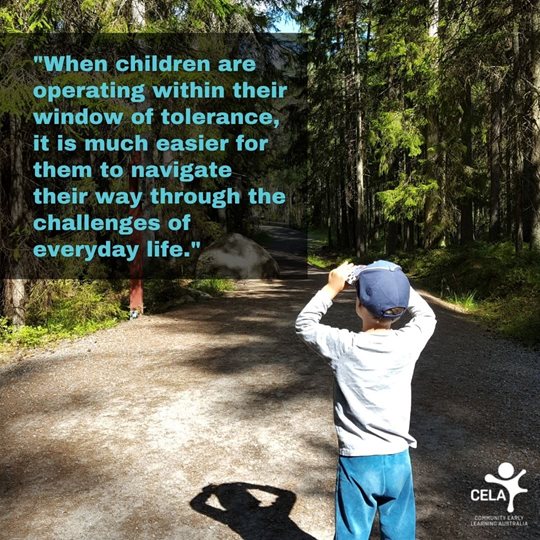By Tom and Erin Pascall
When adults and children are within their 'window of tolerance', they are able to properly function and navigate their way through life's challenges, including at work or at play in an ECEC setting. When faced with situations outside of their window, people may go into survival mode and find it challenging to think, reason or act 'rationally'.
The window of tolerance as seen in early childhood settings
The 'window of tolerance' was first discussed by Daniel Siegel, M.D., professor of clinical psychology at UCLA School of Medicine. It has long been referred to in the realm of trauma informed therapy. It refers to the window in which an individual (and in the case of the early childhood setting, a child) can function properly. When children are operating within their window of tolerance, it is much easier for them to navigate their way through the challenges of everyday life. They can play with their peers, engage in social interactions, manage smooth transitions, and engage with learning environments with minimal distress.

On either side of the window of tolerance, children will experience hyperarousal (fight or flight) or hypoarousal (freeze). When children venture outside of this ideal zone, their prefrontal cortex, often thought of as the rational brain, shuts down. This leads children to feel overwhelmed and demonstrate responses or behaviours which often seem chaotic or overly rigid.
Children outside of their optimal window are in survival mode. They cannot think, reason, or rationalise when feeling under threat. The width of the window is fluid. It varies from person to person as well as depending on the environmental situation. We like to view the width as a result of the previous life history of the child combined with their current circumstances (the current environment, both internal and external).
Expanding the window
As early childhood educators, we play an important role in the lives of children. We are in a position to assist children in building emotional regulation and grounding skills in order to expand the child's window. We believe that it is important to teach these skills to all children as prevention is always better than reaction.
Helpful skills for getting through periods of dysregulation
- Take deep breaths, intentionally extend the exhale
- Stand as tall as possible, feel your feet push away from the ground beneath you
- Take shoes off and feel your feet connect with the earth as you go for a walk around the room or in the yard
- Squeeze/flex body parts and then release them (hands, feet, shoulders, toes, etc.)
The importance of understanding your own window of tolerance - and asking for help
Working in early childhood education settings can be draining both physically and mentally. With this in mind, we encourage everyone to consider where they are in their own window of tolerance spectrum. It is difficult to offer meaningful support to children when we are outside of our own personal window.
Of course, it is totally understandable that you may emotionally find yourself outside your window of tolerance, and you should never judge yourself for asking someone else to "tap in" to assist. This is an adult version of a strategy for moving back within our window of tolerance. It can help you in supporting children on their own regulation journey.
After all, if we do not find ways of regulating our emotions, how can we effectively support children in doing so?
Sources
Corrigan, F. M., Fisher, J. J., & Nutt, D. J. (2010). Autonomic dysregulation and the Window of Tolerance model of the effects of complex emotional trauma. Journal of Psychopharmacology, 25(1), 17–25. https://doi.org/10.1177/0269881109354930
Gill, L. (2017, November 25). Understanding and Working with the Window of Tolerance. Attachment and Trauma Treatment Centre for Healing (ATTCH). https://www.attachment-and-trauma-treatment-centre-for-healing.com/blogs/understanding-and-working-with-the-window-of-tolerance.
Author bios
Tom Pascall
Tom holds a Diploma in ECEC and is currently studying Psychology at the University of Newcastle. He began his studies after identifying a lack of psychological education and support for educators in the early childhood sector. He hopes to one day work with children as a psychologist while also providing trauma informed support for early childhood educators. Tom has a range of experience working with neurodiverse children and a passion for sharing the tools and techniques he has picked up along the way. He also has a passion for involving males in the early childhood environment and in the lives of children. He is an advocate for dads and father figures, and loves his own role as father of two, early childhood age children.
Erin Pascall
Erin is currently working as the Director and Nominated Supervisor at a beautiful childcare centre in NSW. She has a Bachelor of Science in Psychology from the American University of Paris. Erin has worked with children in a variety of settings from art studios to gardens, and finally in early childhood settings. She has a passion for supporting educators in gaining the tools necessary to support children in developing strong social and emotional foundations for the future. She also works hard to provide this support to her two young children, alongside her partner Tom.
About CELA
Community Early Learning Australia is a not for profit organisation with a focus on amplifying the value of early learning for every child across Australia - representing our members and uniting our sector as a force for quality education and care.